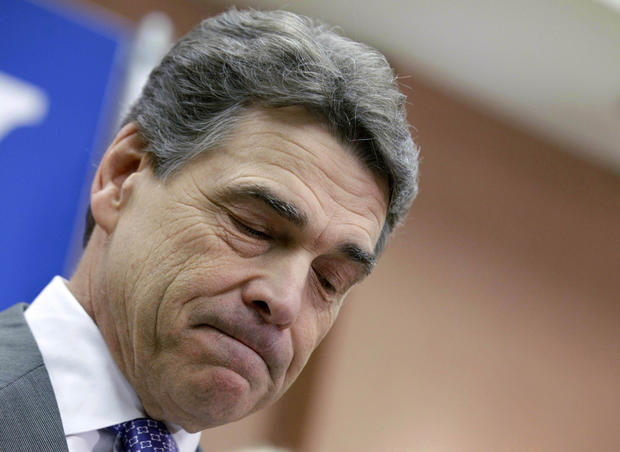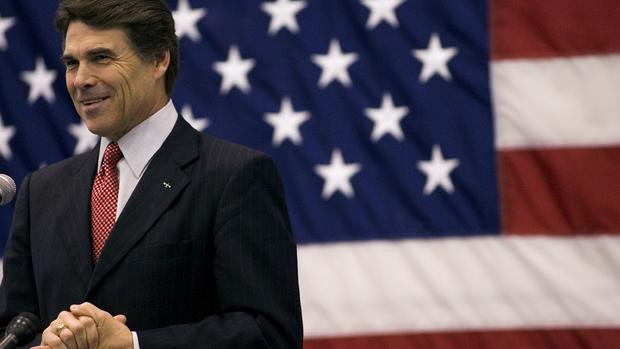Rick Perry: What went wrong?
If you had to pick one word to sum up Rick Perry's presidential run, there's no contest: Oops! But that isn't quite enough for a postmortem on the most disappointing campaign of the 2012 cycle, which effectively ended on Thursday. Below, five reasons the Perry campaign went wrong:
Rick Perry drops his presidential bid
1) He wasn't ready for prime time: The Texas governor entered the presidential race in August as the biggest threat to Mitt Romney, a longtime governor of a job-rich state who could raise oodles of money and unite the Tea Party and evangelical base with the establishment. Then came time for people to actually get to know him. Perry's initial debate performances were so bad that they prompted speculation that his struggles were due to the influence of pain medication following summer back surgery. Perry eventually got better, but not before he offered up the YouTube moment of the campaign: His inability to remember the third cabinet agency he would cut. He looked like a high school student who had forgotten a list he had memorized, not someone who understood the issues at hand. And that wasn't the sort of thing voters were willing to shrug off.
2) Old scandals came back to haunt him: As governor, Perry signed an executive order mandating that middle-school girls be vaccinated against the sexually-transmitted virus HPV. That decision touched on a sore spot for small-government types as well as social conservatives, and rival Michele Bachmann hammered him for what she deemed a "government injection" of the drug. Then there was the issue of immigration, and specifically Perry's 2001 signing of a law allowing in-state tuition rates at state universities for illegal immigrants. Perry suggested his critics on the issue didn't "have a heart," which played terribly among GOP primary voters, many of whom strongly oppose illegal immigration. Perry was unprepared to effectively deal with either story, and they hurt him with the base voters upon whom his campaign depended.
3) Paid media didn't do the job: This was a campaign cycle in which the many debates played an outsize role in the rise and fall of candidates - and positive television commercials did not. Perry blanketed the airwaves in Iowa in an attempt to rejuvenate his campaign; he finished in fifth place, spending more than $350 per vote in the process. One of the lessons of the 2012 election is turning out to be that in the age of the Internet, traditional positive paid media seems to matter less than it used to - and Perry's campaign amounts to exhibit A. (That's not to say that negative paid media has lost its potency, as Newt Gingrich's Iowa slide in the face of super PAC attacks illustrated.)
4) Focus on social issues didn't pay off : Right before kicking off his campaign, Perry held a prayer-event called "The Response" to rally the faithful, and in his Iowa ads he offered culture war rhetoric like "you don't need to be in the pew every Sunday to know that there's something wrong in this country when gays can serve openly in the military but our kids can't openly celebrate Christmas or pray in school." Yet Perry's focus on social issues and religion came at a time when Americans overwhelmingly tell pollsters they are focused primarily on the economy; that's part of the reason Mitt Romney, who touts his business experience ahead of his social conservatism, is the frontrunner for the nomination. Another reason for Romney's edge is that there were a number of strong social conservatives in the race, including Bachmann, Rick Santorum and (to a lesser extent) Gingrich; Perry needed to emerge from a crowded field to become the consensus conservative choice, and his early stumbles made that all but impossible.
5) Campaign disarray: As Politico reported late last year, a rift developed between the Texas-based team that Perry has long surrounded himself with and the consultants brought on to help Perry become a national candidate. The latter group complained that Perry's Texas team didn't do the basic work of campaigning, including polling and developing an opposition research book on their own candidates in order to figure out how to deal with attacks. While it's hard to know exactly what went on internally, there's little doubt that Perry failed to develop a clear message - was he a jobs candidate like Romney, a social conservative warrior like Santorum, or a tough-talking Texan like George W. Bush? Perry never carved out a clear identity, and voters in turn never found a reason to rally behind him.

